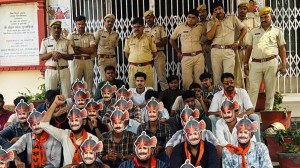No funds or passports,many Indians stranded in Yemen
Embassy sets up helpline,tries to evacuate as many as possible.
The helpline hasn’t stopped ringing. The callers almost always have the same question: how can the Indian embassy help them get out of Yemen?
One of the callers is Anil Kumar,a labourer from Kerala. He barely speaks English and can just about muster a few words in Hindi. He wants to leave,he says,but can’t pay the ticket fare or the exit fine for staying in Sanaa illegally.
He left home “for a better life”,he says. He had no education,he just had dreams which came crashing down when the Arab Spring turned ugly in Yemen as forces loyal to President Ali Abdullah Saleh angered the armed tribes.
Kumar is just one among the many who K V Chandrasekharan,an attache at the Indian Embassy,speaks to during the course of the day. For the past week,the phone has rung day and night,with people calling for advice and asking for help. Most are afraid to venture out,and those who are brave enough face many challenges as petrol has run out in the city in which one in every six men has a gun.
Calls have been coming in from India too — from relatives of those who have not been registered on the embassy’s database.
The Indian embassy in Yemen expected trouble. As revolutionary fever spread through the Arab world,Yemenis too took to the streets. At first it was a largely peaceful protest with students,teachers and lawyers asking Saleh to quit his post which he has held for 32 years. But Saleh refused to budge and the tribes he angered have unleashed weeks of firing in the Capital,leaving about 370 dead.
The rush to leave started a week ago when rumours of a civil war circulated. Saleh’s palace was attacked,and he along with members of his cabinet were injured. Saleh is now in Saudi Arabia undergoing treatment.
“It’s like Kabul over here,nothing is predictable,the gunfire just erupts,” says Chandrasekharan. The Ambassador,Dr Ausaf Sayeed,set up a Twitter account soon after the protests. At first the tweets relayed helpline numbers; as the revolution picked up pace,the tweets asked Indians to register with the mission. Yesterday,Sayeed tweeted,”All Indian nationals must leave Yemen now.” But the matter is not quite as simple as that.
Yemen is among the main recipients of Indian labour. It is estimated that there are 14,000 Indians working in Yemen,with at least 5,000 based in Sanaa — most are unskilled workers and nurses. Despite the calls for registration,many Indians who are unskilled and uneducated remain unaware.
“How can we find all our citizens,” asks Samir K Chakraborty,consular assistant. Many Indians in Yemen reside in the country illegally. They enter the country on a tourist visa and find jobs in construction. For each day spent over the visa limit,the Yemeni government charges a 300 riyal fine (Rs 62). The embassy has cases of people overstaying for up to two years.
Although the Government of India has now said that all Indians must be evacuated and it will meet the costs for destitute workers,there are more hurdles.
Most of the people who have come knocking on the embassy’s doors are labourers,and it is customary for the employers to keep their passports. So the embassy now faces the challenge of issuing emergency travel documents.
Sayeed has been shuttling back and forth to the Ministry of Immigration — his aim is clear: to get out as many people as he can. Yesterday,three people boarded the flight to India,66 nurses now await departure,and another 44 labourers are expect to travel soon. But travel is taking place by commercial carriers and the waiting lists are long.
Today,25 emergency passports were made for a one-way passage to India. The 25 now wait in the embassy’s premises for their departure.
The embassy has tied up with travel agents in Sanaa but the queues outside out-number the number of seats available per day. Meanwhile,the embassy has stocked up on water and essential supplies.
“Today is calm but who knows about tomorrow,” says Chakraborty. The embassy staff are taking each day at a time,evacuating those they can as quickly as possible.
- 01
- 02
- 03
- 04
- 05































